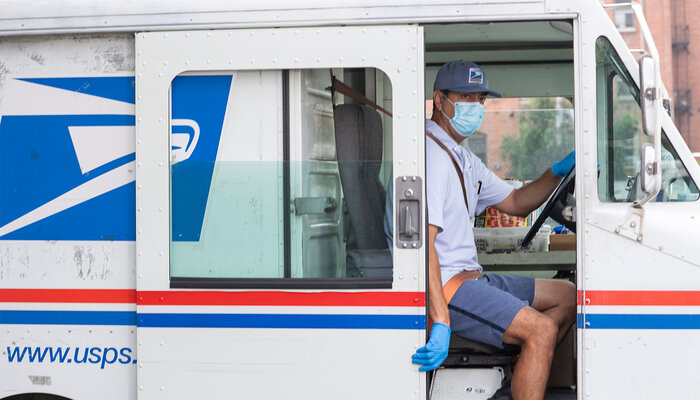Why Mail Service Is So Important to People in Prison
An incarcerated mother explains how the U.S. Postal Service is her lifeline, and a formerly incarcerated man talks about the legal implications of mail disruption.

For those behind bars, the U.S. Postal Service is critical to communicating with the outside world. To get a sense of just how important it is, we spoke with Tami Eldrige and Kevin Hammerschimdt about their experiences while incarcerated and the role that mail plays in the day-to-day of life in prison.
Eldrige is currently incarcerated in Bedford Hills Correctional Facility in Westchester County, New York, and has been serving her sentence for more than 20 years. She is a mother of two and is in the process of receiving a bachelor’s degree from Marymount Manhattan College-Bedford Hills.
Hammerschimdt is currently a paralegal at the Square One Development Group in St. Louis. While incarcerated, he earned an associate’s degree in political science and government through Washington University in St. Louis’s Prison Education Project. This spring, he will receive his bachelor’s degree from the university while serving as a consultant with the Prison Education Project.
How does mail factor into daily life in prison?
Tami Eldrige: Throughout 19 years of my now 21 years of incarceration, my children’s lives have become tangible with every piece of mail that I have received. We have become emotionally connected through letters, cards, schoolwork, and artistic efforts. We were able to touch, hug, kiss, and cry together through letters. My children invited me into their lives every day through their letters, and I constantly reminded them of my love through mine.
It is difficult for me to give you an exact number of letters that I have sent or received. One letter feels as if it could fill one thousand days.
Kevin Hammerschimdt: Letter mail means a lot to the incarcerated, particularly for personal connections. I also received a lot of correspondence courses — Christian, college, paralegal — some of which are time sensitive. The most important, however, is legal mail, which is integral to one’s ability to move forward in their personal case proceedings.
How do/did you communicate generally with your family, friends, and legal representation?
Eldrige: Although we now have access to email, I still believe in the old school methods of communicating. I still write personal letters, make handmade cards, and use fancy stationery (as my daughter calls it), which I believe is an effective way to show my children that I am still personally vested in writing to them. Also, handwritten letters display emotions such as expressing gratitude or bereavement to people who have impacted my life or my children’s lives during my incarceration.
Hammerschimdt: I communicated through the U.S. Postal Service. Even though the Missouri Department of Corrections offers email, communication is not confidentially protected, so USPS is the only way to correspond in the legal aspect.
Are/were other forms of communication — such as email, video, phone — easily accessible in your facility? Do you know if cost or availability limits your peers’ ability to use these technologies?
Eldrige: Emails and videos are easily accessible to us because we are able to keep our tablets with us in our cells at all times. This allows us to view videos if they were sent and to write emails at our leisure — or to be later downloaded on the kiosk, which is located in the common area of our recreation room. The “video gram” offers instant visions into our families’ and friends’ lives in 30-second intervals and same-day emails.
Inmates such as myself who do not receive any financial support and live off of state wages cannot fully benefit from the services these tablets offer due to the high cost. Without prepaid stamps, purchased for me by my family and friends, I would not be able to email. We can also use the phone with the help of family and friends.
Hammerschimdt: Emails cost 25 cents to send and phone calls are 5 cents a minute. I believe video calls still have not been implemented, and they will be very expensive.
Kevin, if the USPS had stopped providing mail service in a timely manner, how would that have impacted your experience during incarceration?
Hammerschimdt: One issue I can certainly speak to is that legal mail is time sensitive. In other words, providing information or responding to a legal issue (child support, civil cases, criminal cases, etc.) within 10 days of the mailing date is required. That is very hard to meet with the current operation of the prison’s mail system. Consequently, further delays will make that impossible. After the institution receives legal mail, they say it gets priority for delivery, but there is at least a two- to three-day delay in getting it to the prisoner. Once the recipient gets it, five or six days have elapsed of the 10 days allowed. Further mailing delays would deny the prisoner an opportunity to respond to time-sensitive mail, and they suffer the many different repercussions that entails, legally and financially.
Tami, what role does mail play in your ability to receive an education behind bars?
Eldrige: Due to the onset of Covid-19, mail correspondence became a vital component for college students to finish out the winter semester. Now that we are in the fall semester, we have been fortunate enough to continue receiving our education through mail correspondence. I am currently three classes away from receiving my bachelor’s degree from Marymount Manhattan College-Bedford Hills campus.
If you could speak directly to Postmaster General Louis DeJoy about the impact his reduction of USPS capacity has on incarcerated individuals, what would you say?
Eldrige: I would let him know that receiving letters from loved ones, especially if you are a parent, is a vital component to repairing and mending relationships. Also, letters cannot be supplemented by any of these technological devices.
My children and I have irreplaceable memories of moments and events that we can look back on and share that would not have been possible through any of these new forms of communication. I have what some of us longtermers call “an archive of love letters” from my children that I am able to revisit. Moments like my children’s first time writing in scripted letters, their first picture they drew of me, their first song they wrote, them learning how to write poetry, their first crush, and my most prized treasure: simply writing a few lines to show that, even when they were busy, they thought to say something to me and send it with a stamp.
Hammerschimdt: Any change to the mailing system that causes disruption of needed services or infringes on timely delivery is egregious. DeJoy should take politics out of the mailing system and not allow himself to be influenced by politics in official decision making. The people (incarcerated or not) are the ones who matter here — do not ever forget or lose sight of that. His changes will deny prisoners’ access to the courts, family, and higher education.
Tami, is there anything else you would like people to know about the role that mail plays in the life of an incarcerated person?
I have already mentioned the emotional impact mail correspondence has had throughout my two decades in prison. However, now as I strive for my freedom, mail correspondence still remains an important factor in my life as well as for other incarcerated individuals. In fact, the most recent letter that I got to include in my “archive file” was delivered by the USPS.
For my freedom, I collect letters from family and friends for the parole board panel to consider. Included in that mail is a letter that I received from my eldest daughter, who is now 26 years old, during the early years of my incarceration, where she asked me questions like: “How long Mommy, will they keep you?” and “Will they let you go soon?’’





